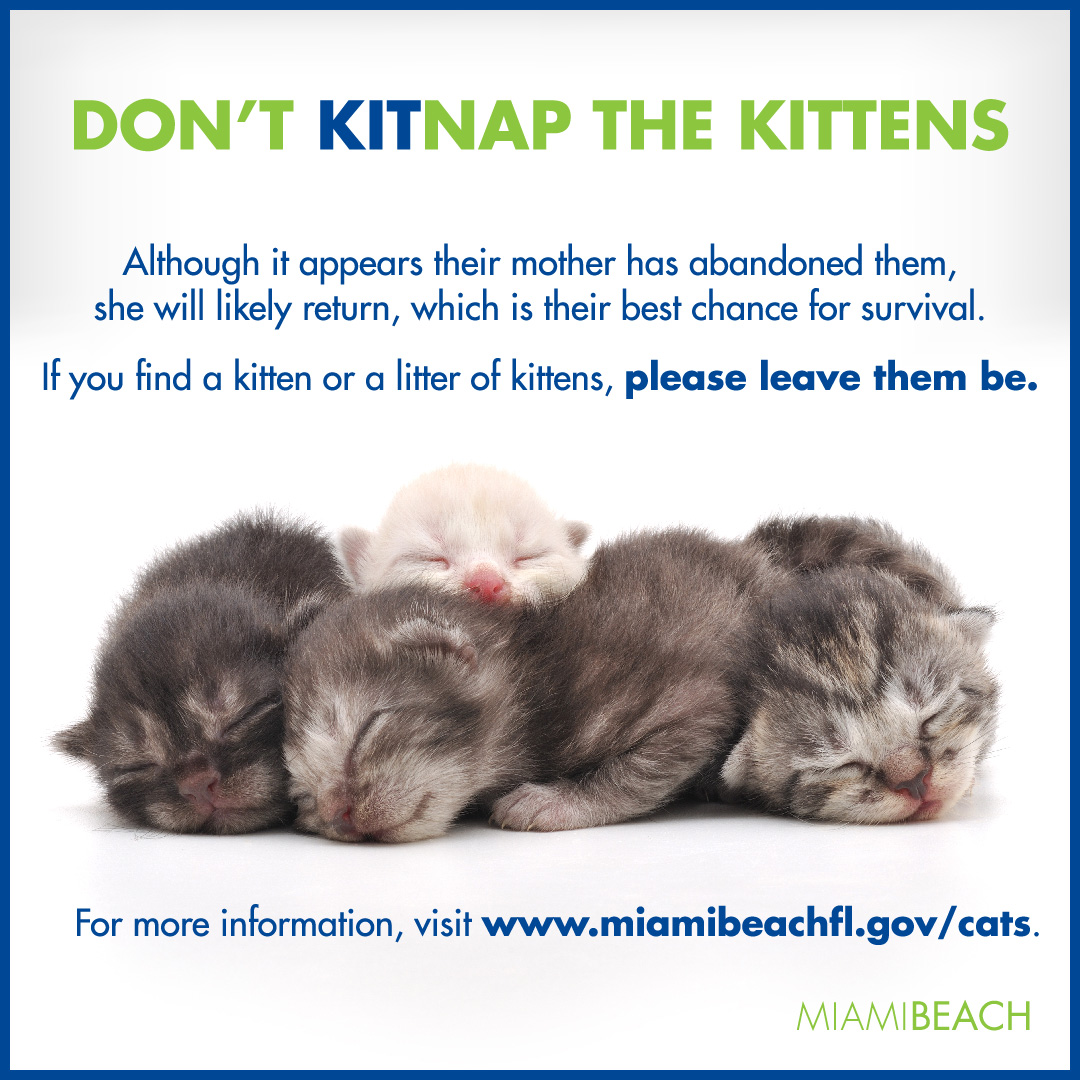
Miami Beach Community Cat Program
The City of Miami Beach partners with SoBe Cats Spay & Neuter, Inc. to humanely manage our city’s community cat population via a three-pronged approach:
- Trap Neuter Vaccinate Return (TNVR): We help facilitate TNVR events with area volunteer trappers for community cats that cannot be adopted. The Kitty Campus, Saving Sage Animal Rescue, Sobe Cats, Operation Paw and Miami-Dade Animal Services Mobile clinic are all partners that assist the city in these efforts.
TNVR Request (click here) - Adoption: We spay/neuter and place friendly, adoptable kittens into our pawesome adoption program at the Kitty Campus so that we can find them a loving home and get them off the streets. Adoptable kitties have gone through a brief quarantine process where they are dewormed, vaccinated, given flea medication etc.
ADOPTION KITTIES, APPLICATION AND CONTRACT (click here) - Registered Feeder Program: We help our community cats live humanely outside via our Registered Feeder Program. Our feeders are an integral part of the TNVR program as they not only feed and provide fresh water to the cats, but they also help monitor cat colonies. Feeders follow best practices to educate on TNVR options and techniques so we can ensure the cat gets fixed and is vaccinated.
Help us control the cat population in your neighborhood by following these rules:
- Register to become a feeder or trapper. We help train and educate volunteers on best practices for working with community cats.
- No trespassing onto private property when feeding cats.
- Keep feeding areas clean and out of sight by leaving food for no more than one hour.
- Report new cats for Trap-Neuter-Vaccinate-Return (TNVR). Cats that have been spayed/neutered can be identified by a "snip" in the cat's left ear.
- To deter cats from coming onto your property, natural deterrents include fresh orange and lemon peels, citrus scented fragrances, coffee grounds, vinegar, pipe tobacco as well as lavender, lemongrass, citronella and eucalyptus oils.
Registered Volunteers are always needed!
- You can volunteer at the Kitty Campus, as a registered feeder and/or trapper.
- Registered feeders are the key to our success as cats congregate around feeding locations, making it easier to trap, treat and monitor their populations.
- Feeders are the first to identify cats that need to be fixed and to locate new litters of kittens while they are still young enough to be adoptable.
To become a registered volunteer feeder/trapper, please email info@SoBeCats.org.
To donate, please visit www.sobecatsspayandneuter.org.
Click here to visit Miami-Dade County’s Animal Services.
Miami-Dade County Animal Services Department advises “Don't Kit-Nap the Kittens” this Kitten Season

In most cases, newborn kittens don’t need human intervention and, in fact, taking these very young kittens inadvertently creates orphaned kittens who have slim chances of survival without their mom. It’s always best to keep the mother and kittens together to ensure the kittens can thrive; at least until the kittens are eating on their own and can be safely removed for socialization and adoption. Due to the round-the-clock care neonatal kittens require, the mortality rate of these newborn kittens is very high. We rely on volunteers to give orphaned neonatal kittens the care they need to survive. If you would like to become a volunteer or foster, or report kittens, please contact info@sobecats.org
If you find a litter of kittens, residents should remember to:
- Leave them where they are unless they appear to be in danger. Do not interfere with the kittens as it may cause stress to the mother. If you’d like to provide assistance, consider providing food and water for the mother, placed a good distance from the nest.
- If the kittens are in immediate danger, like under a car or in a flooded area, find a safe place nearby to relocate them. If you must move them, make sure they’re still close enough for their mother to find them.
- Observe the kittens from a distance. The mother is most likely out looking for food and will return to care for her babies.
- If you have observed the kittens for 24 hours and are confident that the mother will not return, you may intervene and care for them. For all resources kitten related, please see https://www.kittenlady.org/
- If you find kittens that are eating independently, then contact SoBe Cats, the Miami Beach Cat Program Coordinator, or a local shelter.
SoBe Cats Kitty Campus is a 501C3 NO-KILL RESCUE that must have a LIMITED ADMISSION POLICY to be able to provide the quality of care that each kitty needs for optimal health. Kitty Campus will never euthanize a cat for space, behavioral issues, or treatable illnesses.
If you found kittens please email info@sobecats.org. Kitty Campus does not accept kittens/cats on a walk-in basis as there is an ongoing waiting list being worked through.
Text


 83°
83°